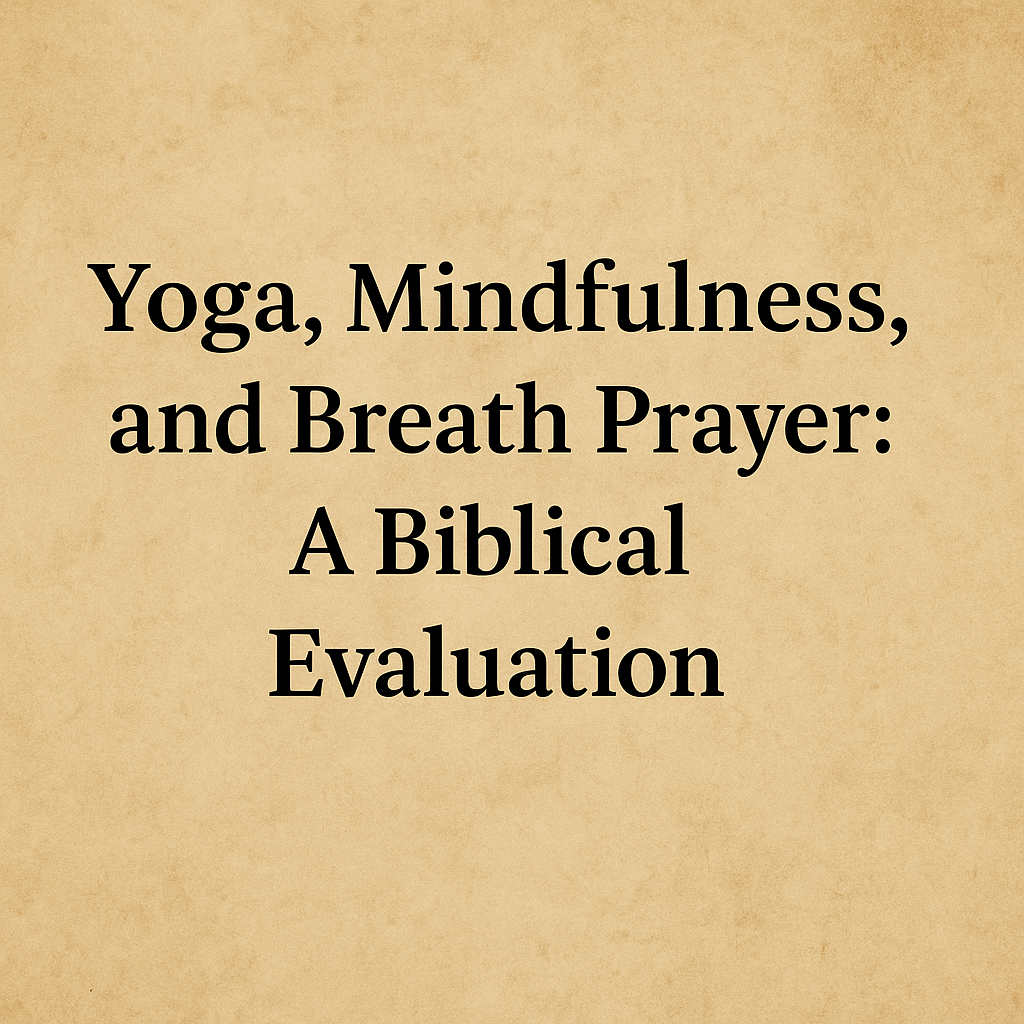⏱️ Estimated Reading Time: 6 min read
Yoga, Mindfulness, and Breath Prayer: A Biblical Evaluation
In recent years, practices like yoga, mindfulness, and breath prayer have exploded in popularity—even among Christians seeking spiritual formation practices. From fitness studios and counseling offices to corporate retreats and church small groups, these approaches are often promoted as harmless ways to reduce stress, improve focus, and promote well-being. Yet beneath their appealing surface, many Christians are unaware of the spiritual foundations and Eastern meditation influences that undergird them. While not everything about stretching or slowing down is wrong, believers must be clear-eyed about where these practices come from, what they teach, and how they shape our hearts.
Yoga: More Than Just Stretching for Christians
Yoga is frequently framed in Western culture as a form of physical exercise or relaxation technique. However, historically and philosophically, yoga is an ancient Hindu discipline designed to unite the practitioner with the divine. The very word yoga means “to yoke.” According to Subhas Tiwari, an authority on yoga philosophy:
“Yoga is Hinduism. Yoga is the practice and Yoga is the goal.”[1]
While some Western adaptations have tried to remove overt spiritual language, the roots remain. Participation in yoga—especially forms that involve chanting mantras, seeking enlightenment, or focusing on one’s “inner divinity”—is much more than exercise. It is a spiritual discipline that operates within a worldview fundamentally opposed to biblical Christianity.[2]
Even “Christian yoga” or “holy yoga” attempts to baptize practices whose foundations remain incompatible with a Christian understanding of the body, sin, and salvation. The Bible is clear:
“What fellowship has light with darkness?” — 2 Corinthians 6:14
Biblical Meditation vs. Mindfulness
Mindfulness is often marketed as a neutral technique for managing anxiety or improving focus. But at its core, mindfulness is deeply rooted in Buddhist meditation practices.[3][4] Mindfulness techniques typically encourage practitioners to empty their minds, observe thoughts without judgment, and cultivate detachment. Ronald Purser writes:
“Mindfulness originates from Buddhism… Stripped of its ethical and spiritual context, it becomes a commodified technique.”[3]
While stress reduction can be helpful, Christians should be cautious about techniques that blur the line between relaxation and spiritual formation. The Bible calls believers to a different kind of mental engagement:
- Set your minds on things above (Colossians 3:2).
- Take every thought captive to obey Christ (2 Corinthians 10:5).
- Test the spirits to see whether they are from God (1 John 4:1).
Biblical meditation is not about emptying the mind but about filling it with God’s truth.
Breath Prayer: A Christian Perspective
Breath prayer is another practice growing in popularity among those exploring Christian contemplative spirituality. It involves selecting a short phrase—such as “Jesus, have mercy”—and repeating it rhythmically in sync with breathing. Though sometimes presented as a simple way to focus on God, breath prayer is rooted in contemplative spiritual traditions that emphasize emptying the mind to experience a mystical union with God.[5][6]
Jesus warned against prayer that becomes formulaic or mechanical:
“When you pray, do not heap up empty phrases as the Gentiles do, for they think they will be heard for their many words.” — Matthew 6:7
Christian prayer is never about repetition to induce altered states. It is a living conversation with the Father, guided by the Holy Spirit and shaped by Scripture.
What About Buddhist Meditation Methods?
Buddhist meditation is centered on inner peace, mental discipline, and spiritual awakening. It often involves mantras that directly invoke or honor false gods:
- Om Mani Padme Hum: “Hail to the jewel in the lotus.”
- Om Namah Shivaya: “I bow to Shiva, the supreme deity of transformation.”
- Om Gum Ganapatayei Namah: “I bow to Ganesh… I pray for blessings and protection.”
These words are not neutral. The Lord commands His people not to take up the names of other gods on their lips (Exodus 23:13). Even if repeated without understanding, such phrases can easily amount to vain babblings (2 Timothy 2:16–18) or “idle words” for which we will give account (Matthew 12:36).
Moreover, Eastern meditation teaches that the ultimate solution to the human condition is found within—not in Christ. These religions propose that the divine is hidden inside us, waiting to be uncovered through mystical experience. This is the opposite of the gospel, which proclaims that we are sinners in need of rescue, not hidden divinity.
Biblical Meditation: Filling the Mind with Truth
Biblical meditation is not about emptying the mind but about filling it with God’s revealed truth. Consider the psalmist’s example:
“Blessed is the one… whose delight is in the law of the LORD, and who meditates on His law day and night.” — Psalm 1:1–2
Scripture calls us to actively engage our minds, to think deeply about God’s works, promises, and commands:
- I meditate on your precepts and consider your ways (Psalm 119:15).
- Within your temple, O God, we meditate on your unfailing love (Psalm 48:9).
- Meditate upon these things; give thyself wholly to them (1 Timothy 4:15).
Biblical meditation leads to worship, conviction, and growth in godliness—not an altered state of consciousness.
What Should Christians Do Instead?
While it is good to care for our bodies and minds, believers must be discerning about what practices shape our souls. Instead of adopting spirituality rooted in pagan religions, Christians should:
- Exercise with a Clear Conscience: Enjoy stretching without the rituals and philosophies attached to yoga.
- Pray Biblically: Speak to God in your own words, allowing Scripture to guide your prayers.
- Meditate on God’s Word: Reflect deeply on Scripture and fill your mind with truth.
- Be Discerning: Test every practice against the Word of God (1 Thessalonians 5:21).
Final Word
Not everything that promises peace leads to life. Christians are called to renew their minds in the truth (Romans 12:2), test every spirit (1 John 4:1), and worship God in spirit and truth (John 4:24). Practices that compromise the gospel—even subtly—are not spiritually neutral. They are doorways to confusion and compromise.
If you desire deeper communion with God, you don’t need mystical mantras or borrowed rituals. You need His Word, His Spirit, and His people.
References
- Subhas Tiwari, Yoga: The Ancient Indian Science of Self-Realization. Yoga Bharati, 2002.
- Albert Mohler, The Subtle Body — Should Christians Practice Yoga? Read here.
- Ronald Purser, McMindfulness. Penguin, 2019.
- Jon Kabat-Zinn, Wherever You Go, There You Are. Hyperion, 1994.
- Richard Foster, Celebration of Discipline. HarperCollins, 1978.
- Thomas Merton, New Seeds of Contemplation. New Directions, 1961.
- David Wells, No Place for Truth. Eerdmans, 1993.



